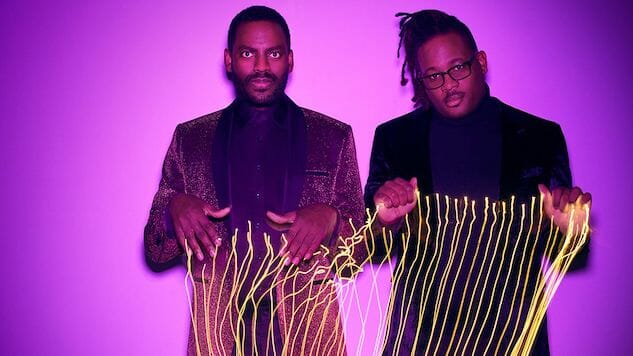The New Negroes Is a Monument to the Variety of African-American Voices in Stand-Up
Photo by Ramona Rosales, Courtesy of Comedy Central
As a cis straight white male, there’s a good chance I’m probably not the best person to write a review of a show called The New Negroes. After all, the project, hosted by Baron Vaughn and Open Mike Eagle, who spun it off from their live show of the same name, is a celebration of Black existence in the modern era. Then I remembered that at 34, I’m still technically within the coveted 18 to 35 male demographic Comedy Central advertisers salivate for. My only qualifications are literally my privilege and value to Nielsen numbers, but in some ways, I think that makes me an ideal New Negroes viewer.
Having grown up white and in Tennessee during the ‘90s, it’s impossible to really overstate the importance of pop culture in learning about race, both good or bad. For a long time, the only representation I saw of Black people in media were singers on Broadway, the Winslows on Family Matters, and music videos. Then I found Def Comedy Jam, the first genuinely profane art I ever got to consume in a household that sang Monty Python commercials to each other. My life wouldn’t be the same without Martin Lawrence, Adele Givens, Bernie Mac, and Bill Bellamy.
But at that early age, it also gave me a myopic view of Blackness, helped by the fact that it was snuck behind my parents back. There wasn’t any context, nor anyone to correct the assumptions of what I heard. Usually, there weren’t any counterpoints. As a white kid experiencing the Black culture through art, diversity of ideas mattered, and the lack of them gave me a shallow understanding of a rich culture. So why the hell am I talking so much about myself? Because I can’t imagine how invaluable a show like New Negroes would have been when I was a kid or in college. Hell, even now.
Baron Vaughn and Open Mike Eagle have created a stand-up comedy/musical sketch show that presents a wide range of voices and perspectives from different Black comedians. Each episode is based around a theme and features three stand-up acts. “Identity” has Chris Redd, Shalewa Sharpe and Langston Kerman. The second episode, “Criminality,” showcases Donnell Rawlings, Ed Greer and Lil Rel Howery. Episode three meanwhile is based on “Wokeness” with sets by David Gborie, Candice Thompson and Tone Bell.
Segmenting each episode into themes allows the show to explore different sides of one issue in the span of 25-minutes. Each episode is great, but “Identity” is an incredible choice for a first impression. Saturday Night Live’s Chris Redd delivers a set about growing up around crack heads in Chicago that’s a savagely funny take on seeing grown-up things through a child’s eyes.
Shalewa Sharpe’s segment about the struggle to find love tackles everything from generational pickup lines to race-based dating apps. “We came up with Soul Swipe,” she explains. “It’s a dating app for black people. And the occasional cheeky Jew. Just trying to get in there Beastie Boys style. You gotta respect that. I see you Joshua.”
Langston Kerman explores how modern society demands everyone be political when all he wants is to watch Say Yes To The Dress. That then turns into a bit about finding his own inner truth while judging a woman’s dress. The sets are brilliant, tight and crushingly funny. But most importantly, each one is uniquely its own, showcasing distinctive voices from different regions, backgrounds and even ages.
-

-

-

-

-

-

-

-

-

-

-

-

-

-

-

-

-

-

-

-

-

-

-

-

-

-

-

-

-

-

-

-

-

-

-

-

-

-

-

-








































